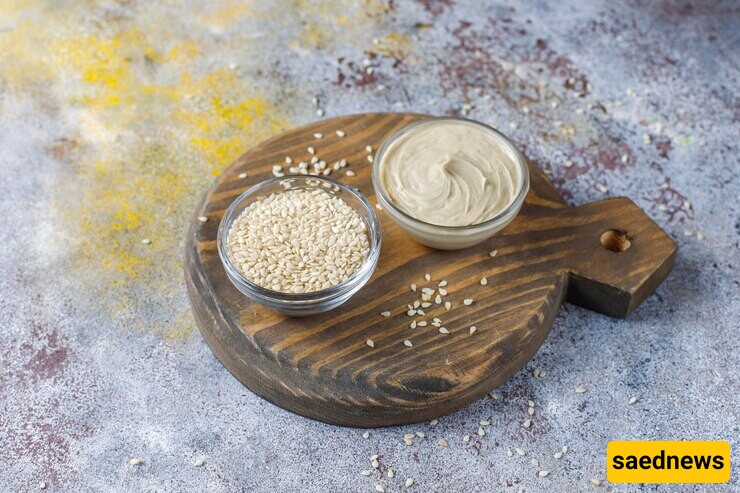SAEDNEWS: Sesame tahini is a nutrient-rich superfood with exceptional health benefits. Known for its natural composition, free from any additives or preservatives, tahini is a go-to choice for boosting overall well-being. In this article, we’ll explore its health benefits, nutritional value, and important precautions for consumption.


1. What is Tahini?
Tahini is a smooth, creamy paste made from hulled, roasted, and finely ground sesame seeds, with the natural oil retained for maximum richness. Often enjoyed as part of a breakfast meal, it provides sustained energy for the day.
2. Warm Nature of Tahini:
With its naturally warm and moist properties, tahini is especially beneficial for individuals with a cold temperament.
3. The Perfect Winter Food:
Tahini is an energy-dense food, making it ideal for winter months when the body needs extra fuel to stay warm.
4. Supports Heart Health:
Regular but moderate consumption of tahini can reduce bad cholesterol (LDL) while increasing good cholesterol (HDL), supporting cardiovascular health.
5. Rich in Calcium:
Packed with calcium, tahini strengthens bones and teeth, promoting long-term skeletal health.
6. Ideal for Children:
Tahini is highly recommended for children as it provides essential energy for their active lifestyles and supports cognitive development.
7. Healing Properties:
Tahini helps soften internal abscesses and hardened swellings. However, excessive consumption in individuals with a cold temperament may lead to skin breakouts.
8. Cancer Prevention:
Rich in antioxidants, tahini helps protect the body against cancer by neutralizing harmful free radicals.
9. Natural Laxative:
Tahini promotes digestive health by acting as a natural laxative, preventing constipation and aiding smooth bowel movements.

Calories: 595 kcal
Carbohydrates: 21.19 g
Fat: 53.76 g
Protein: 17.00 g
Water: 3.05 g
Vitamin A: 67 IU
Thiamine (B1): 1.220 mg (94%)
Riboflavin (B2): 0.473 mg (32%)
Niacin (B3): 5.450 mg (36%)
Pantothenic Acid (B5): 0.693 mg (14%)
Vitamin B6: 0.149 mg (11%)
Folic Acid (B9): 98 mcg (25%)
Vitamin B12: 0.00 mcg (0%)
Calcium: 426 mg (43%)
Iron: 8.95 mg (72%)
Magnesium: 95 mg (26%)
Manganese: 1.456 mg (73%)
Phosphorus: 732 mg (105%)
Potassium: 414 mg (9%)
Sodium: 115 mg (5%)
Zinc: 4.62 mg (46%)

Regulates menstrual cycles.
Supports uterine health.
Enhances sexual health and energy.
Reduces the risk of cardiovascular diseases.
Consuming 1–2 tablespoons of tahini before meals can reduce appetite and prevent overeating, aiding weight loss.
Overconsumption, however, can lead to weight gain due to its high calorie and fat content.
For weight gain, tahini can be paired with date syrup to increase caloric intake.
Tahini Preparation: Sesame seeds are soaked, hulled, and ground into a smooth paste.
Sesame Oil Preparation: Extracted either by heating sesame seeds or using a cold-press method to retain its nutrients.
Store tahini and sesame oil in a cool, dry place away from direct sunlight.
Exposure to heat and light can cause the fats to oxidize, affecting taste and quality.
Overconsumption can cause weight gain.
Not suitable for individuals with diabetes.
Sesame oil is not suitable for deep frying.
Excessive intake may cause vascular blockages.
Side effects can be mitigated with vinegar, lemon juice, or other acidic foods.
Sesame tahini is a powerhouse of essential vitamins, minerals, healthy fats, and amino acids. Its benefits range from improving bone health and balancing cholesterol levels to enhancing digestion and supporting overall wellness. However, moderation is key to avoiding potential side effects.
For those aiming for a balanced diet and better health, tahini is a fantastic addition to daily nutrition. Share this knowledge with health-conscious friends and explore more health-related content in the Saed News health section. Thank you for reading!

